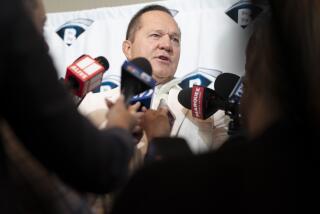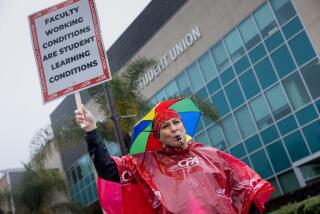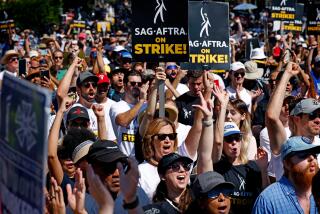Owners Overwhelmingly Reject Labor Agreement
CHICAGO — Major league baseball owners overwhelmingly rejected the proposed labor agreement during a seven-hour meeting Wednesday but voted unanimously to accept it if the players’ union agrees to what acting Commissioner Bud Selig called “certain modifications and clarifications.”
Modifications and clarifications?
While Selig insisted that the owners could accept the “vast majority of issues” in the proposed agreement, it was learned that they basically want an entire rewrite.
“It’s a dead deal,” said a source familiar with the situation.
He revealed that the owners will ask the players to reverse their stance on five major issues in the agreement that management negotiator Randy Levine and union leader Donald Fehr finalized in Atlanta during the World Series and added:
“What the owners are trying to do is overturn the entire agreement. It’s an emphatic rejection [by the owners], and they’re trying to put the monkey on the players’ back.”
In a secret ballot, owners rejected the agreement, 18-12. With Arizona and Tampa Bay, the 1998 expansion teams, allowed to vote, supporters needed 23 for approval. The 18 negative votes more than doubled the needed eight.
The owners then voted 30-0 to authorize their executive council to accept the deal without another vote by the full ownership--providing the union OKs the modifications and clarifications, which clearly won’t happen.
Fehr, who was in London to make a speech and will return today, issued a statement, in which he said the Oct. 24 agreement had represented “a historic opportunity” to put years of discord aside “and move forward together for the first time.”
“The fact that the owners have repudiated their own negotiator makes the future quite uncertain,” Fehr said. “The players were willing to live with an agreement they did not like because they understand that compromise is the essence of . . . bargaining and because the overall agreement is the first step in the long-term stability needed to rebuild this industry. It is regrettable that the owners today decided not to do the same.”
What the owners decided was to ask the players to 1) eliminate the option on a second, tax-free year in 2001; revise totally the thresholds at which the luxury tax is triggered; give up service-time credit for the 75 regular-season days they were on strike in 1994-95; drop the provision that calls for players and owners to jointly ask Congress for clarification of the sport’s antitrust exemption so that baseball players have the same protections as those in other sports, and give up all litigation and claims brought by the union against the owners during the strike.
It is virtually a call to war, a management source admitted, since “the owners had to know the union won’t agree to all those changes. It is nothing more than a publicity stunt.”
However, Selig said he would discuss the next step in the process with Levine this morning and hoped to arrange a meeting--to be attended by Levine, himself and other owners--with union officials as soon as possible.
He set Nov. 15 as the deadline for a deal, the last possible date clubs can finalize the 1997 schedule and the day free agents can begin to sign with teams other than their own.
In a remarkable attempt at spin control, Selig ignored both the union’s likely reaction and the 18-12 repudiation of Levine when he said Wednesday’s events “brought us closer to finalizing a deal.”
Asked how the owners could reject an agreement that was reached by their negotiator while in constant contact with Selig and the owners’ labor policy committee, the acting commissioner said:
“I don’t want to dwell in the past. I’m only looking to the future. Randy has never specifically said he had an agreement, only that he had done as much as he could do and had gone as far as he could go with Don.
“The clubs had been mailed the proposal, but this was their first chance to analyze it together and respond to each other.”
Levine, expected to resign shortly, rolled his eyes in apparent disbelief when told Selig had claimed that he had never specifically said there was an agreement.
“I was very disappointed when I heard the vote, but I don’t want to say anything until I talk to Bud about what happened,” Levine said, having been excluded from the deliberations after opening the meeting with a presentation on the proposal.
He added: “There were some suggestions I had acted beyond my authority [regarding certain provisions in the agreement with Fehr] but that was disposed of today. Several owners stood and confirmed that wasn’t the case.”
Owners and players now seem headed for another year under expired work rules and the possibility of another work stoppage at some point in 1997 if the owners attempt to return to court and implement their own provisions.
The absence of a new agreement would mean no interleague play in ’97 (probably forcing the owners to put both Arizona and Tampa Bay in the American League), no luxury tax to control big-market spending, no revenue sharing for the small markets and no major licensing deals for an industry attempting to rebuild.
Those are survival issues.
In Wednesday’s meeting, according to sources, bickering owners even had a fight over whether to vote by secret ballot and how to determine if Tampa Bay and Arizona should vote.
It was a meeting, the sources said, dominated by Chicago White Sox owner Jerry Reinsdorf’s ongoing attempt to derail the agreement--assisted blatantly by Selig.
“It’s not in the best interest of fans, players or owners to reach an agreement that doesn’t solve our problems,” Reinsdorf said, adding that choosing between the status quo and the current proposal “is like choosing which of the Menendez brothers you like best.”
However, Diamondback owner Jerry Colangelo, a supporter of the proposed agreement and the peace it represents, said:
“If you’re looking at a choice of chaos today or chaos in five years, I’d vote for chaos in five years. The hope would be that you could develop a relationship [with the union] in the next four years that would enable you to avoid that chaos.”
More to Read
Are you a true-blue fan?
Get our Dodgers Dugout newsletter for insights, news and much more.
You may occasionally receive promotional content from the Los Angeles Times.







